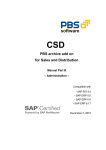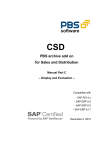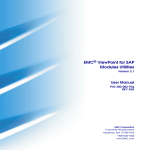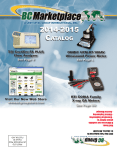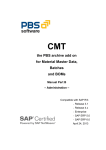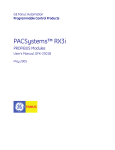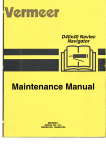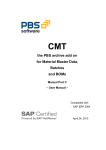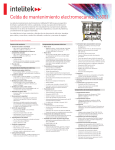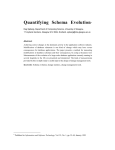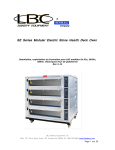Download EMC ViewPoint for SAP Sales and Distribution Module
Transcript
300_002_932_a02.book Page i Tuesday, February 14, 2006 11:30 AM EMC ViewPoint for SAP Sales and Distribution Module Version 2.0 ADMINISTRATION MANUAL P/N 300-002-932 REV A02 EMC Corporation Corporate Headquarters: Hopkinton, MA 01748-9103 1-508-435-1000 www.EMC.com 300_002_932_a02.book Page ii Tuesday, February 14, 2006 11:30 AM Copyright © 2006 EMC Corporation. All rights reserved. Published February, 2006 EMC believes the information in this publication is accurate as of its publication date. The information is subject to change without notice. THE INFORMATION IN THIS PUBLICATION IS PROVIDED “AS IS.” EMC CORPORATION MAKES NO REPRESENTATIONS OR WARRANTIES OF ANY KIND WITH RESPECT TO THE INFORMATION IN THIS PUBLICATION, AND SPECIFICALLY DISCLAIMS IMPLIED WARRANTIES OF MERCHANTABILITY OR FITNESS FOR A PARTICULAR PURPOSE. Use, copying, and distribution of any EMC software described in this publication requires an applicable software license. For the most up-to-date listing of EMC product names, see EMC Corporation Trademarks on EMC.com. All other trademarks used herein are the property of their respective owners. ii EMC ViewPoint for SAP SD Module Administration Manual 300_002_932_a02.book Page iii Tuesday, February 14, 2006 11:30 AM Contents Preface.............................................................................................................................. v Chapter 1 Introducing the ViewPoint for SAP SD Module Introduction ...................................................................................... 1-2 Overview on the ViewPoint SD Module ...................................... 1-3 Nomenclature............................................................................ 1-3 Navigation up to release 4.5.x................................................. 1-3 Navigation from release 4.6..................................................... 1-4 Basic information on the ViewPoint SD Module ................. 1-5 Original documents from optical archive ............................. 1-7 Chapter 2 Construction of the ViewPoint SD Module Load program................................................................................... 2-2 Construction of the ViewPoint archive.................................. 2-2 First ViewPoint load run.......................................................... 2-6 Further load runs ...................................................................... 2-9 Data backup............................................................................. 2-10 Common problems during the archive construction ........ 2-10 Loading of administration table /PBS/CSD_FILE ................... 2-11 Data transfer from release 3.x to 4.x ............................................ 2-13 Chapter 3 ViewPoint SD Archiving Long-term archiving........................................................................ 3-2 General ....................................................................................... 3-2 Customizing .............................................................................. 3-2 Access to the transferred data................................................. 3-3 Archive utilities ................................................................................ 3-5 EMC ViewPoint for SAP SD Module Administration Manual iii 300_002_932_a02.book Page iv Tuesday, February 14, 2006 11:30 AM Contents Reading the ViewPoint archive .............................................. 3-5 Example reports for archive access ........................................ 3-8 Read SAP archiving run ........................................................ 3-13 Chapter 4 Miscellaneous ViewPoint SD in unicode systems................................................. 4-2 Generals ..................................................................................... 4-2 Index generation ....................................................................... 4-2 Archive tool ............................................................................... 4-4 Long-term archive .................................................................... 4-6 Printing archive documents for ViewPoint SD Module ............ 4-8 ViewPoint print programs....................................................... 4-8 Customer specific print programs ......................................... 4-8 Testing print programs .......................................................... 4-10 Printing of individual texts ................................................... 4-12 Rebate processing of archived invoices...................................... 4-13 Creating indexed invoices for volume based rebate ......... 4-13 Transactions of the ViewPoint SD Module ................................ 4-15 Tabular overview of transactions ......................................... 4-15 Renaming ViewPoint transactions ....................................... 4-17 Customer specific reporting......................................................... 4-18 Instructions for conversion of own reports ........................ 4-18 Appendix A Additional SD Information Reference to archived sales documents ...................................... A-2 Migration of R/2 data ................................................................... A-4 iv EMC ViewPoint for SAP SD Module Administration Manual 300_002_932_a02.book Page v Tuesday, February 14, 2006 11:30 AM Preface As part of an effort to improve and enhance the performance and capabilities of its product line, EMC from time to time releases revisions of its hardware and software. Therefore, some functions described in this manual may not be supported by all revisions of the software or hardware currently in use. For the most up-to-date information on product features, refer to your product release notes. If a product does not function properly or does not function as described in this manual, please contact your EMC representative. ViewPoint Functionality This document describes how to administer the various components that make up EMC ViewPoint for SAP Sales and Distribution (SD) Module. EMC’s technology allows you to effectively manage your application data by providing the ability to define the access, retention, and service level requirements for any business transaction at each point in its lifecycle. Audience This guide is part of the ViewPoint documentation set, and is intended for use by anyone administering the ViewPoint for SAP SD Module. It is assumed that the installer has a working knowledge of SAP Basis, and has the appropriate levels of responsibilities to perform the tasks described. EMC ViewPoint for SAP SD Module Administration Manual v 300_002_932_a02.book Page vi Tuesday, February 14, 2006 11:30 AM Preface Related Documentation Be sure to review the EMC ViewPoint for SAP Release Notes for the most up-to-date information on product features. The following list of related documents are available on the EMC ViewPoint for SAP Documentation CD that was delivered with your EMC ViewPoint SAP software CD. Both the release notes and documentation CD can be found at: http://Powerlink.EMC.com Introductory ◆ EMC ViewPoint for SAP Documentation CD ◆ EMC ViewPoint for SAP Release Notes Installation ◆ EMC ViewPoint for SAP Modules Installation Manual ◆ EMC ViewPoint for SAP Analyzer Plus Installation and User Manual ◆ EMC ViewPoint for SAP BW Analyzer Installation Manual ◆ EMC ViewPoint for SAP Construction and Maintenance Installation Manual ◆ EMC ViewPoint for SAP Fiscal Year Reporter Module Installation and User Manual Miscellaneous EMC ViewPoint for SAP Material Master Data, Batches, Special Stocks, and BOMs Module Modification Manual ◆ Administrative EMC ViewPoint for SAP Controlling Line Items Module Administration Manual ◆ vi ◆ EMC ViewPoint for SAP Financial Accounting and Material Documents Module Administration Manual ◆ EMC ViewPoint for SAP Purchasing Module Administration Manual ◆ EMC ViewPoint for SAP Sales and Distribution Module Administration Manual ◆ EMC ViewPoint for SAP Production Orders Module Administration Manual ◆ EMC ViewPoint for SAP Agency Business Module Administration Manual ◆ EMC ViewPoint for SAP Construction and Maintenance Module Administration Manual EMC ViewPoint for SAP SD Module Administration Manual 300_002_932_a02.book Page vii Tuesday, February 14, 2006 11:30 AM Preface ◆ EMC ViewPoint for SAP Costing-Based Profitability Analysis Module Administration Manual ◆ EMC ViewPoint for SAP Master Data Changes Module Administration Manual ◆ EMC ViewPoint for SAP Data Retention Tool Module Administration Manual ◆ EMC ViewPoint for SAP Contract Account Documents Module Administration Manual ◆ EMC ViewPoint for SAP HR Archiving Objects Module Administration Manual ◆ EMC ViewPoint for SAP Material Ledger Documents Module Administration Manual ◆ EMC ViewPoint for SAP Material Master Data, Batches, Special Stocks, and BOMs Module Administration Manual ◆ EMC ViewPoint for SAP Controlling Orders Module Administration Manual ◆ EMC ViewPoint for SAP Profit Center Line Items Module Administration Manual ◆ EMC ViewPoint for SAP Plant Maintenance Module Administration Manual ◆ EMC ViewPoint for SAP Production Orders Module Administration Manual ◆ EMC ViewPoint for SAP Process Orders Module Administration Manual ◆ EMC ViewPoint for SAP Project Systems Module Administration Manual ◆ EMC ViewPoint for SAP Line Items Module Administration Manual ◆ EMC ViewPoint for SAP Special Ledger Module Administration Manual ◆ EMC ViewPoint for SAP Warehouse Management Module Administration Manual ◆ EMC ViewPoint for SAP Custom Module Administration Manual User EMC ViewPoint for SAP Analyzer Plus Installation and User Manual ◆ ◆ EMC ViewPoint for SAP Analyzer Lite Installation and User Manual EMC ViewPoint for SAP SD Module Administration Manual vii 300_002_932_a02.book Page viii Tuesday, February 14, 2006 11:30 AM Preface viii ◆ EMC ViewPoint for SAP Analyzer BW User Manual ◆ EMC ViewPoint for SAP Controlling Line Items Module User Manual ◆ EMC ViewPoint for SAP Financial Accounting and Material Documents Module User Manual ◆ EMC ViewPoint for SAP Purchasing Module User Manual ◆ EMC ViewPoint for SAP Sales and Distribution Module User Manual ◆ EMC ViewPoint for SAP Production Orders Module User Manual ◆ EMC ViewPoint for SAP Modules Utilities User Manual ◆ EMC ViewPoint for SAP Agency Business Module User Manual ◆ EMC ViewPoint for SAP Construction and Maintenance Module User Manual ◆ EMC ViewPoint for SAP Costing-Based Profitability Analysis Module User Manual ◆ EMC ViewPoint for SAP Master Data Changes Module User Manual ◆ EMC ViewPoint for SAP Contract Account Documents Module User Manual ◆ EMC ViewPoint for SAP HR Archiving Objects Module User Manual ◆ EMC ViewPoint for SAP Material Ledger Documents Module User Manual ◆ EMC ViewPoint for SAP Material Master Data, Batches, Special Stocks, and BOMs Module User Manual ◆ EMC ViewPoint for SAP Controlling Orders Module User Manual ◆ EMC ViewPoint for SAP Profit Center Line Items Module User Manual ◆ EMC ViewPoint for SAP Plant Maintenance Module User Manual ◆ EMC ViewPoint for SAP Production Orders Module User Manual ◆ EMC ViewPoint for SAP Process Orders Module User Manual ◆ EMC ViewPoint for SAP Project Systems Module User Manual ◆ EMC ViewPoint for SAP Special Ledger Module User Manual ◆ EMC ViewPoint for SAP Export Interface for Special Ledger Data User Manual ◆ EMC ViewPoint for SAP Warehouse Management Module User Manual EMC ViewPoint for SAP SD Module Administration Manual 300_002_932_a02.book Page ix Tuesday, February 14, 2006 11:30 AM Preface ◆ Conventions Used in This Guide EMC ViewPoint for SAP Fiscal Year Reporter Module Installation and User Manual EMC uses the following conventions for notes, cautions, warnings, and danger notices. Note: A note presents information that is important, but not hazard-related. ! CAUTION A caution contains information essential to avoid data loss or damage to the system or equipment. The caution may apply to hardware or software. WARNING A warning contains information essential to avoid a hazard that can cause severe personal injury, death, or substantial property damage if you ignore the warning. DANGER A danger notice contains information essential to avoid a hazard that will cause severe personal injury, death, or substantial property damage if you ignore the message. Typographical Conventions EMC uses the following type style conventions in this guide: bold • User actions (what the user clicks, presses, or selects) • Interface elements (button names, dialog box names) • Names of keys, commands, programs, scripts, applications, utilities, processes, notifications, system calls, services, applications, and utilities in text italic • Book titles • New terms in text • Emphasis in text Courier • • • • • • Prompts System output Filenames Pathnames URLs Syntax when shown in command line or other examples EMC ViewPoint for SAP SD Module Administration Manual ix 300_002_932_a02.book Page x Tuesday, February 14, 2006 11:30 AM Preface Where to Get Help Courier, bold • User entry • Options in command-line syntax Courier italic • Arguments in examples of command-line syntax • Variables in examples of screen or file output • Variables in pathnames <> Angle brackets for parameter values (variables) supplied by user. [] Square brackets for optional values. | Vertical bar symbol for alternate selections. The bar means or. ... Ellipsis for nonessential information omitted from the example. EMC support, product, and licensing information can be obtained as follows. Product information — For documentation, release notes, software updates, or for information about EMC products, licensing, and service, go to the EMC Powerlink website (registration required) at: http://Powerlink.EMC.com Technical support — For technical support, go to EMC WebSupport on Powerlink. To open a case on EMC WebSupport, you must be a WebSupport customer. Information about your site configuration and the circumstances under which the problem occurred is required. Your Comments Your suggestions will help us continue to improve the accuracy, organization, and overall quality of the user publications. Please send your opinion of this guide to: [email protected] x EMC ViewPoint for SAP SD Module Administration Manual 300_002_932_a02.book Page 1 Tuesday, February 14, 2006 11:30 AM 1 Invisible Body Tag Introducing the ViewPoint for SAP SD Module This chapter includes these topics: ◆ ◆ Introduction ........................................................................................1-2 Overview on the ViewPoint SD Module ........................................1-3 Introducing the ViewPoint for SAP SD Module 1-1 300_002_932_a02.book Page 2 Tuesday, February 14, 2006 11:30 AM Introducing the ViewPoint for SAP SD Module Introduction The ViewPoint modules are constructed in modular form and cover the application modules FI, SD, MM, CO, etc. with a special program package for exactly this application. You can easily see from the name which ViewPoint module belongs to which SAP module: FI, SD, MM, CO, etc. All ViewPoint modules have in common that they can be easily installed in the SAP R/3 system via the SAP transport utilities "tp" and "SAINT". Installation details of the ViewPoint modules are in the EMC ViewPoint for SAP Modules Installation Manual. This administration manual was written to make construction and administration of the ViewPoint SD Module as easy as possible. At first, data archiving with transaction SARA is discussed; the second topic is the ViewPoint index construction from the SAP archive files. The EMC ViewPoint for SAP Modules Utilities User Manual contains additional module information. 1-2 EMC ViewPoint for SAP SD Module Administration Manual 300_002_932_a02.book Page 3 Tuesday, February 14, 2006 11:30 AM Introducing the ViewPoint for SAP SD Module Overview on the ViewPoint SD Module Nomenclature Although in the days of R/2, the term Reorganization actually meant the Archiving of completed documents, today the first term is mainly used to describe the physical reorganization of the database, whereas the second means writing completed documents to sequential files while removing them from the database. In this manual we use the term Archiving completely in the SAP sense: Processes controlled by SAP programs such as the checking of documents regarding their archivability, the writing of these documents to sequential archive files and the removing of the documents from the database are collectively called Archiving. The archiving is controlled centrally by the SAP transaction SARA. With the ViewPoint SD Module, ViewPoint now provides a program package which allows the user to access the SAP archive files in online operation as if they had never been archived. Also, in order to completely relieve the database from index data, the documents on the SAP archive files are read by our load programs and transferred into the file system, complete with all necessary index information. This process is called Loading and Construction of the ViewPoint SD Module. Navigation up to release 4.5.x A global menu is supplied with the ViewPoint module for all products and utilities of ViewPoint Software; and a special menu for the SD Module. The global menu is started via transaction /PBS/PBS. Having entered this transaction, a button appears in the tool bar, where it is possible to branch to this ViewPoint menu via mouse click. This global ViewPoint menu enables the user to branch to the menu for the ViewPoint SD Module. A second possibility to access the menu of the ViewPoint SD Module is by entering directly the transaction /PBS/CSD. All programs and user transactions described in this manual are contained in the SD menu. Overview on the ViewPoint SD Module 1-3 300_002_932_a02.book Page 4 Tuesday, February 14, 2006 11:30 AM Introducing the ViewPoint for SAP SD Module Table 1-1, “ViewPoint SD menus and transaction codes,” summarizes the information above. Table 1-1 Central ViewPoint menus ViewPoint SD menus and transaction codes Transaction codes Up to SAP release 3.1 SAP release 4.0 SAP release 4.5 ViewPoint Main Menu ZPBS /PBS/PBS + click on button ViewPoint module /PBS/PBS + click on button ViewPoint module ViewPoint SD Menu ZCSD /PBS/CSD /PBS/CSD Navigation from release 4.6 From Release 4.6 the user menu has completely changed due to the implementation of the SAP Easy Access technique. This has also had an effect on the transactions in the environment of the ViewPoint modules. The delivery of the ViewPoint SD Module contains area menus /PBS/PBS (main menu of the ViewPoint modules) and /PBS/CSD (sales functions). From these menus, you now have to generate activity groups (4.6B) or roles (from 4.6C) respectively, which can then be integrated into the user master. You can also create an activity group/role directly from the Easy Access menu, as shown in Figure 1-1, “ViewPoint SAP Easy Access menu.” Figure 1-1 ViewPoint SAP Easy Access menu You are free to choose the name of the activity group/role; the name can also be within the ViewPoint naming area. A ViewPoint area menu is then transferred by pressing the function key 'Transfer menus from area menus' by indicating the corresponding ViewPoint menu name. During the transfer, the system query for the resolution of the area menu is to be answered with 'Yes'. The role/activity group created in this way can now be integrated in the corresponding user master. We recommend assignment of the 1-4 EMC ViewPoint for SAP SD Module Administration Manual 300_002_932_a02.book Page 5 Tuesday, February 14, 2006 11:30 AM Introducing the ViewPoint for SAP SD Module global activity group/role /PBS/PBS to administrators and the special function menu /PBS/CSD to the end users, as shown in Figure 1-2, “Special Function menu.” Figure 1-2 Special Function menu Please see the current SAP standard documentation for more details on the creation of activity groups/roles. Basic information on the ViewPoint SD Module The administrative task of the ViewPoint module is to construct and activate the ViewPoint archive and, in the event of problems, to analyze the archive with the tools that are delivered together with the software. Construction and use of the ViewPoint SD Module requires successful data archiving with SAP tools and access to the archive file created this way. From 4.0B, this access can also be realized with "Archive Link" via an optical archive system. In each case, the status of the archive file must be qualified with "Accessible". The ViewPoint SD Module uses the archiving runs of the archiving objects: ◆ SD_VBAK — Sales documents ◆ RV_LIKP — Delivery notes ◆ SD_VBRK — Invoices ◆ SD_VTTK — Transports ◆ LE_HU — Handling Units (from release 4.6C) The SAP archiving program is executed with transaction SARA. Standard archiving is not described in this manual. Overview on the ViewPoint SD Module 1-5 300_002_932_a02.book Page 6 Tuesday, February 14, 2006 11:30 AM Introducing the ViewPoint for SAP SD Module You can determine the status of the archive files for the individual archiving runs via transaction SARA, as shown in Figure 1-3, “Status of archive file.” Figure 1-3 Status of archive file To achieve correct display of documents and to realize reporting via the ViewPoint Module, the deletion run of the SAP archiving must have been successful. The generated SAP archiving runs are read and written into the file system of the ViewPoint SD Module, as described in the EMC ViewPoint for SAP Modules Installation Manual, via the ViewPoint load program /PBS/CSD_LDR3. During this process, secondary indices are created in the file system to guarantee efficient access. If a ViewPoint archive already exists, the load program adds the new 1-6 EMC ViewPoint for SAP SD Module Administration Manual 300_002_932_a02.book Page 7 Tuesday, February 14, 2006 11:30 AM Introducing the ViewPoint for SAP SD Module data from the SAP archive to this already existing archive, as shown in Figure 1-4, “Construction of the ViewPoint Module.” PBS Load program SAP Archive files Existing PBS archive New PBS archive Figure 1-4 Construction of the ViewPoint Module After the ViewPoint archive has been constructed, it still has to be activated in the R/3 System. For this purpose, please run ABAP /PBS/CSD_FILE. The documents can now be displayed from the ViewPoint module. Chapter 2, “Construction of the ViewPoint SD Module,” describes the programs for the construction and the activation of the ViewPoint SD Module. Original documents from optical archive The ViewPoint display transactions support the display of original documents from optical archives. No further settings are necessary in order to do this. You just have to ensure that the link in the R/3 System referring to the original document in tables TOA01, TOA02 ... TOAHR is not deleted. Overview on the ViewPoint SD Module 1-7 300_002_932_a02.book Page 8 Tuesday, February 14, 2006 11:30 AM Introducing the ViewPoint for SAP SD Module 1-8 EMC ViewPoint for SAP SD Module Administration Manual 300_002_932_a02.book Page 1 Tuesday, February 14, 2006 11:30 AM 2 Invisible Body Tag Construction of the ViewPoint SD Module This chapter includes these topics: ◆ ◆ ◆ Load program .....................................................................................2-2 Loading of administration table /PBS/CSD_FILE ..................... 2-11 Data transfer from release 3.x to 4.x ..............................................2-13 Construction of the ViewPoint SD Module 2-1 300_002_932_a02.book Page 2 Tuesday, February 14, 2006 11:30 AM Construction of the ViewPoint SD Module Load program Construction of the ViewPoint archive Figure 2-1 Load program /PBS/CSD_LDR3 constructs the ViewPoint CSD Module from the SAP archive files. The program can be started via transaction SE38 or via the CSD menu Archive Administration > Load R/3 Documents or Generate Index, as shown in Figure 2-1, “Selection screen of load program /PBS/CSD_LDR3.” Selection screen of load program /PBS/CSD_LDR3 In each case, the program should run as a background process. 2-2 EMC ViewPoint for SAP SD Module Administration Manual 300_002_932_a02.book Page 3 Tuesday, February 14, 2006 11:30 AM Construction of the ViewPoint SD Module Shows Figure 2-2 The selection screen of load program /PBS/CSD_LDR3, as shown in Figure 2-2, “ViewPoint SD Module delimitation screen.” ViewPoint SD Module delimitation screen Below, we explain the delimitations and their effects when constructing the ViewPoint SD Module. Select archive Figure 2-3 This is where you can select the archiving runs created with transaction SARA of the SAP archiving objects SD_VBAK, RV_LIKP, SD_VBRK, SD_VTTK and - from release 4.6C - LE_HU, which you can use to construct the ViewPoint SD Module. After pressing one of the buttons (Sales, Distrib, Invoice, Transport, HandlUnit), all corresponding SAP archiving runs created from the indicated date (from ....) are displayed, as shown in Figure 2-3, “Archive administration.” Archive administration Now select those SAP archiving runs (in this example SD_VBAK) you want to load into your ViewPoint archive. The system checks if this run has not already been loaded and displays an error message if this is the case. Load automatically from 01.05.2003 If you want to archive all SD documents from a certain date without having to select each SD archive individually, please use this parameter. If there are SAP archives among them, which you have already archived during a previous run, they are not transferred to Load program 2-3 300_002_932_a02.book Page 4 Tuesday, February 14, 2006 11:30 AM Construction of the ViewPoint SD Module the ViewPoint archive a second time. The parameter "max. number phys. files" indicates the maximum number of SAP ADK files which should be processed. This function automates the load runs and can be scheduled as background job by using a selection variant. Delete old run If you have already carried out several load runs and you want to delete one or more of these runs, you can press the button Run to display a list of the previous load runs. Now you can mark and delete the load runs you want. The SAP SD archives to be deleted are displayed afterwards. All new documents processed Load sequence of documents only: from 1 to 9,999,999 Figure 2-4 In general, the radio button 'All new documents…' should be selected. This ensures that all documents in the SAP archiving run are also transferred to the ViewPoint module, as shown in Figure 2-4, “Document selection.” Document selection If the paging area in the system profile for the sorting of the indices is set too low (e.g., termination SYSTEM_NO_MORE_PAGING), it can be useful to not process all documents at one time but to realize several runs with a restricted number of documents. In this case, the second option 'Load a sequence…' should be selected, and the documents to be processed specified in the two following fields. For example, if you want to process 100,000 documents in each run, please enter in the first run "from 1 to 100,000", in the second run "from 100,001 to 200,000" etc. However, before using this method you should first try to load the complete SAP archiving run by increasing the paging area. Note: The function that the program automatically recognizes if a selected SAP archive has already been processed is switched off if the interval delimitation is used. Neither is a check regarding an overlapping of intervals carried out. 2-4 EMC ViewPoint for SAP SD Module Administration Manual 300_002_932_a02.book Page 5 Tuesday, February 14, 2006 11:30 AM Construction of the ViewPoint SD Module Check document date lower limit at archive This parameter additionally enables you to filter the documents that are to be transferred into the ViewPoint module. If this parameter is selected, only those documents from the SAP archiving run are transferred which are newer than the specified lower limit (document date document lower date limit). ViewPoint archive system with copy SAP document By marking this parameter, as shown in Figure 2-5, “Archive range,” the complete document information is copied during the construction of the ViewPoint module. In this case, the SAP archive files are not required by the reading accesses and can be stored elsewhere. Figure 2-5 ViewPoint archive system with reference to SAP archive Archive range By marking this parameter, a reference to the SAP archive file is created during the construction of the ViewPoint module. The ViewPoint directory then contains only index information; during access the complete document information is taken from the SAP archives. Therefore, when using this method, you have to keep all SAP archiving runs and cannot store them elsewhere on tape. This method can first be used from SAP release 4.x. Note: You should choose between the two methods before you start the initial construction, as a correction of your selection can only be achieved by a new construction. Advantages and disadvantages of both methods In general, if you keep all SAP archiving runs in the online operation, e.g. in an optical archive system, it can be sensible to just create a reference to these archive files as otherwise the document would be stored twice, once in the SAP archive file and a second time in the ViewPoint module. If you plan to transfer the SAP archiving runs later to tape outside your SAP system or if you deactivate parts of the ViewPoint archive later on we recommend you to keep a copy in the ViewPoint system. There is no protocol stating which SAP archive files are referenced, therefore, you can only base your decision on which archiving files can be removed on the date. In summary, the referencing only makes sense if all SAP archiving runs are kept permanently. Load program 2-5 300_002_932_a02.book Page 6 Tuesday, February 14, 2006 11:30 AM Construction of the ViewPoint SD Module Note: From Enterprise release this selection is no longer available. The ViewPoint CSD Module is only constructed with reference to the SAP archive. Note: This parameter specifies the file path for the ViewPoint CSD Module. Make sure that the path name is no longer than 28 characters and ends with a slash '/' for UNIX or backslash '\' for Windows NT, as shown in Figure 2-6, “ViewPoint SD archive pathname.” Figure 2-6 ViewPoint SD archive pathname This path must already exist in the system as it cannot be created explicitly by the load program. If, in addition to CSD, further ViewPoint modules are used (for example, FI, MM, or CO/CA) please provide a separate path for each archive, as described in the EMC ViewPoint for SAP Modules Installation Manual. Under UNIX, please ensure when specifying the path name that the R/3 administrator <SID>adm is the owner of the specified directory, with read and write authorization. The activation of write authorizations is explained with the example of directory /pbs/csd with the command chmod 777 /pbs/csd. Logical paths From May 2003, you can indicate a physical path name instead of a logical one. The assignment of logical path - physical path is carried out in the transaction FILE. Note: The logical path name is not allowed to exceed 28 digits. First ViewPoint load run Having entered all necessary information in the selection screen of load report /PBS/CSD_LDR3, the selection screen can be saved as a selection variant and started as a background process. The ViewPoint SD Module must be constructed for each client. Furthermore, the load program cannot be used in parallel operations, this being prevented technically by the program itself. After the initial construction, the archive path contains the files and directories as shown in Figure 2-7, ”Files of ViewPoint SD Module after initial construction,” on page 2-7. 2-6 EMC ViewPoint for SAP SD Module Administration Manual 300_002_932_a02.book Page 7 Tuesday, February 14, 2006 11:30 AM Construction of the ViewPoint SD Module sun46:e46adm 1% sun46:e46adm 3% Gesamt 12 2 drwxr-xr-x 6 drwxrwxrwx 2 drwxrwx--2 drwxrwx--sun46:e46adm 4% sun46:e46adm 5% Gesamt 128 2 drwxrwx--2 drwxr-xr-x 2 -rw-rw---6 -rw-rw---2 -rw-rw---2 -rw-rw---2 -rw-rw---4 -rw-rw---2 -rw-rw---2 -rw-rw---2 -rw-rw---2 -rw-rw---8 -rw-rw---90 -rw-rw---sun46:e46adm 6% sun46:e46adm 7% sun46:e46adm 8% Gesamt 34 2 drwxrwx--2 drwxr-xr-x 8 -rw-rw---2 -rw-rw---2 -rw-rw---4 -rw-rw---2 -rw-rw---6 -rw-rw---6 -rw-rw---- cd /pbs/csd_e46_df ls -als 4 e46adm 107 root 2 e46adm 2 e46adm cd BELEGE ls -als 2 4 1 1 1 1 1 1 1 1 1 1 1 1 e46adm e46adm e46adm e46adm e46adm e46adm e46adm e46adm e46adm e46adm e46adm e46adm e46adm e46adm cd .. cd BIB001 ls -als 2 4 1 1 1 1 1 1 1 e46adm e46adm e46adm e46adm e46adm e46adm e46adm e46adm e46adm Figure 2-7 sapsys root sapsys sapsys 512 3072 512 512 Sep 18 15:28 . Sep 5 17:41 .. Sep 11 10:42 BELEGE Sep 11 10:42 BIB001 sapsys sapsys sapsys sapsys sapsys sapsys sapsys sapsys sapsys sapsys sapsys sapsys sapsys sapsys 512 512 250 2614 2 50 100 1500 100 100 100 100 3900 45760 Sep Sep Sep Sep Sep Sep Sep Sep Sep Sep Sep Sep Sep Sep 11 18 11 11 11 11 11 5 5 5 5 5 11 11 10:42 15:28 10:42 10:42 10:42 10:42 10:42 17:48 17:48 17:48 17:48 17:48 10:42 10:42 . .. 100AV_Lauf 100AV_Protokoll 100AV_Restart 100AV_Steuerung 100AV_Summen 100C0000000001 100C0000000002 100C0000000003 100C0000000004 100C0000000005 100C0000000006 100T0000000006 sapsys sapsys sapsys sapsys sapsys sapsys sapsys sapsys sapsys 512 512 3528 50 100 1100 800 3000 2900 Sep Sep Sep Sep Sep Sep Sep Sep Sep 11 18 11 11 11 11 11 11 11 10:42 15:28 10:42 10:42 10:42 10:42 10:42 10:42 10:42 . .. 100AV_ZZVFILE 100BV_Steuerung 100BV_Summen 100EA0000006429 100KA0000001001AG0001 100MAL#40Y##########1 100NABBLA###########1 Files of ViewPoint SD Module after initial construction The load program creates two sub-directories in the archive path. Directory BELEGE contains the complete SAP documents (in the case of reference to the SAP archive, the reference is stored). Directory BIB001 contains the indices to the documents. After the successful run, program /PBS/CSD_LDR3 displays a protocol similar to the one in Figure 2-8, ”Protocol of load program /PBS/CSD_LDR3,” on page 2-9. 12:03:07 Start-of-selection Database delimitations Load program 2-7 300_002_932_a02.book Page 8 Tuesday, February 14, 2006 11:30 AM Construction of the ViewPoint SD Module MANUELL X ABAR_MAN 01101990 AUTOMAT ABAR_AUT 01101999 LOESCH ARCHLIST SD_VBAK 000495000495-001SD_VBAK AEQ I Report delimitations ANZ_VON 1 ANZ_BIS 9.999.999 ALL_BEL X NUR_BEL XAR_BEL X XAR_KI X XAR_MI X XAR_NI X PATH /pbs/csdid4/ SCHNELL X R_ZUGANG X R_BESTAN ABDATUM 01011980 XRESTART X Free delimitations This is run number 001 12:03:14 End-of-Selection 12:03:15 End read R2 tape, start sort 12:03:15 End sort 12:03:15 Start merge 12:03:16 End merge D O C U M E N T S T A T I S T I C ---------------------------------New data Document cluster VBUK VBAK STXH CDHDR CDPOS VBFA NAST VBKD VBUP VBAP VBEP KONV VBPA JSTO JEST JCDS 2-8 EMC ViewPoint for SAP SD Module Administration Manual 8 30 30 114 37 81 353 59 42 112 112 219 448 158 112 112 112 300_002_932_a02.book Page 9 Tuesday, February 14, 2006 11:30 AM Construction of the ViewPoint SD Module total Document index cluster: Text index cluster: Customer index cluster: Material index cluster: Purchasing index cluster: S E C O N D A R Y 1 0 12 22 1 I N D E X S T A T I S T I C ------------------------------------------------ Written Archived Written Stock Total Read New Data Written Stock Stock -----------------------------------------------------------------------------------Number ces: 30 0 Number text indices: 0 0 0 112 0 0 112 0 0 112 0 0 112 Number purch.ord.no. indices: 0 30 0 112 Number material indices: 0 indi- 0 0 Number customer indices: 0 document 0 112 The following SAP archives were processed: 000495-001SD_VBAK 23.11.1999 Figure 2-8 Further load runs 21.06.1999 14:13:02 was processed in run 001 Protocol of load program /PBS/CSD_LDR3 If load program /PBS/CSD_LDR3 is started a second time to load more documents into the ViewPoint module, these are added to the documents already existing in the path /pbs/csde47100/BELEGE/. The indices created for the added documents are merged to the already existing indices in /pbs/csde47100/BIB001/ and transferred together into directory /pbs/csde47100/BIB002/. Directory /pbs/csde47100/BIB001/ is then deleted by the load program. In each further load run the path name for the secondary indices (BIB002) is increased by 1 compared to the last load run (BIB001). After the load run a selection statistic is displayed where the archives that have already been constructed are considered. Load program 2-9 300_002_932_a02.book Page 10 Tuesday, February 14, 2006 11:30 AM Construction of the ViewPoint SD Module Data backup We recommend a data backup of the created files after each construction of the ViewPoint module. However, this is not of fundamental importance, due to the restart function of the load program. Common problems during the archive construction If the load process terminates with the message ABAP/4 run time error: SYSTEM_NO_MORE_PAGING and/or EXTRACT_NO_MORE_PAGING This is due to the insufficient size of the SAP paging area. Via SM04, Goto > Memory, an overview of the amount of the roll and paging memory occupied by the active users and their transactions is displayed. You can use this to clarify whether the high quantity of memory space is being used by another program and not by the current program. Use transaction DB11 to check in the current instance profile the two parameters 'rdisp/ROLL_MAXFS' and 'rdisp/PG_MAXFS'. The values entered there inform you of the current block sizes for the roll and paging area (1 Block = 8 Kilobytes, 1 Kilobyte = 1024 Bytes). On the system side, compare the size of the common partition for the roll and the paging area with the values from transaction DB11. If the converted values do not reach the size of the partition, the parameters 'rdisp/ROLL_MAXFS' and 'rdisp/PG_MAXFS' should be adjusted to the value of the provided partition. Start your R/3 System again and repeat the last load run. In addition, we should like to draw your attention to SAP correction no. 14779, which provides more information on the error described above. 2-10 EMC ViewPoint for SAP SD Module Administration Manual 300_002_932_a02.book Page 11 Tuesday, February 14, 2006 11:30 AM Construction of the ViewPoint SD Module Loading of administration table /PBS/CSD_FILE After creation of the ViewPoint module with the load program, the archive must be activated in SAP R/3. Use program /PBS/CSD_FILE - Transaction /PBS/ZVA3 - Activate index - to set up an assignment between the archive directory of the ViewPoint CSD Module and the SAP R/3 System. Only afterwards you can display the documents via the ViewPoint display transactions and access routines, as shown in Figure 2-9, “Report /PBS/CSD_FILE to load administration table.” Figure 2-9 Report /PBS/CSD_FILE to load administration table The administration table does not have to be loaded after each load run but at the latest before the access to the documents of the ViewPoint archive. The path name specifies the directory of the ViewPoint SD Module. Also in this case you can use a logical path name instead of a physical one, as described in “Construction of the ViewPoint archive” on page 2-2. The parameter 'Test import' reads the administration records, without, however, loading them into the SAP R/3 System. The parameter 'Display already imported archives' enables the display of a list of all SAP archiving runs processed with load program /PBS/CSD_LDR3. Loading of administration table /PBS/CSD_FILE 2-11 300_002_932_a02.book Page 12 Tuesday, February 14, 2006 11:30 AM Construction of the ViewPoint SD Module The parameter 'list of processed records' displays a list of all administration records of the ViewPoint module. The list display can be delimited with regard to the criteria 'No. list lines', the record type 'type (C,D,E,F,K,M,N)' and the key 'from Key'. All records are always processed. Finally, if the option 'Import with database update' is selected, the administration records of the created ViewPoint module in the file system are loaded into the SAP R/3 System. 2-12 EMC ViewPoint for SAP SD Module Administration Manual 300_002_932_a02.book Page 13 Tuesday, February 14, 2006 11:30 AM Construction of the ViewPoint SD Module Data transfer from release 3.x to 4.x Program ZZCVCREA must be installed under 3.x to enable the ViewPoint CSD Module that you have created under SAP 3.x to also be read under 4.x. You can request this program as a subsequent transport. When starting this program a coding is generated in the editor. This coding should be transferred with the line command ww..ww into the clipboard. In the 4.x system you must insert this coding into program /PBS/CSD_STRUCT31H by using the line command w. Before doing this, you should delete the contents of /PBS/CSD_STRUCT31H with dd..dd. In summary: The coding created by ZZCVCREA under 3.x substitutes the coding of /PBS/CSD_STRUCT31H under 4.x. Data transfer from release 3.x to 4.x 2-13 300_002_932_a02.book Page 14 Tuesday, February 14, 2006 11:30 AM Construction of the ViewPoint SD Module 2-14 EMC ViewPoint for SAP SD Module Administration Manual 300_002_932_a02.book Page 1 Tuesday, February 14, 2006 11:30 AM 3 Invisible Body Tag ViewPoint SD Archiving This chapter includes these topics: ◆ ◆ Long-term archiving ..........................................................................3-2 Archive utilities ..................................................................................3-5 ViewPoint SD Archiving 3-1 300_002_932_a02.book Page 2 Tuesday, February 14, 2006 11:30 AM ViewPoint SD Archiving Long-term archiving General If, over the years, the directory for the data of the ViewPoint module increases in size, it can be of help to create a new directory regularly in order to load the archive data in this directory (e.g. for each calendar year). On the one hand, this can reduce the run time of the regular load run as the time required for the merging of the indices depends on the number of the already existing indices. On the other hand, parts of the archive can be stored on other media, for example, on tape. This reduces the disk space that is permanently used. Should you need the data again in your SAP system, you just have to reload the directory, specify the path to the system in a control table, and update an administration table. So, within a short period of time, the removed information is again available online. Not only the transactions but also the customer programs adjusted to the ViewPoint module consider both data sources. This function is first realized from SAP release 4.x. Customizing Define archive paths At first the paths have to be defined in which the date to be removed is to be placed or in which the current data is stored. The path definition can be made in the CSD menu under menu option 'Customizing' or directly in the request screen of the activation program for stock removals (transaction /PBS/ZVA6). The defined paths are always assigned to a path number which has to be specified later when reloading the data. In addition, by entering an 'X' in column 'active' the path can be activated. The entry decides whether the reading routines are to make a reading attempt to this path. In column 'Batch' you can select whether background processings should be made for deactivated paths. Besides it is possible to authorize certain user groups to access deactivated paths 3-2 EMC ViewPoint for SAP SD Module Administration Manual 300_002_932_a02.book Page 3 Tuesday, February 14, 2006 11:30 AM ViewPoint SD Archiving (column 'user group'), as shown in Figure 3-1, “Definition of archive paths.” Figure 3-1 Access to the transferred data Figure 3-2 Definition of archive paths If you want to have the transferred data available online again, this data must - if transferred to other media, for example, to tape - be reloaded into a directory on the hard disk. The name of the directory is not important. In a second step, the administration table for this directory should be filled via the roll string Archive Administration > Long-term Archive > Activate Transfer or transaction /PBS/ZVA6 - Long-term Archive (program name /PBS/CSD_FILE_OT), as shown in Figure 3-2, “Activate transfer directories.” Activate transfer directories Long-term archiving 3-3 300_002_932_a02.book Page 4 Tuesday, February 14, 2006 11:30 AM ViewPoint SD Archiving By pressing the upper pushbutton 'Update', the transferred directory is assigned a path number in a control table. Via the pushbutton 'Choose' below you can select one or more entries from the table that you want to qualify as active. When doing this, you can only select those paths for which an 'X' has been entered in the column 'Active'. The selected entries are activated or deactivated after the program is started, depending on the status of the last setting that was selected ('Activate/Deactivate selected paths'). To activate means that the required administration table entries are loaded from the directory into a database table. If you choose 'deactivate', the corresponding entries are deleted. After completion of this process, the directories that have the status active in the path table and whose administration information has been loaded with the above program into the database, are available for the ViewPoint module. You can see if this procedure was successful via the archive tool /PBS/CSD_SCAN by manually entering the path number. 3-4 EMC ViewPoint for SAP SD Module Administration Manual 300_002_932_a02.book Page 5 Tuesday, February 14, 2006 11:30 AM ViewPoint SD Archiving Archive utilities The utilities described below are provided together with the ViewPoint SD Module. Reading the ViewPoint archive /PBS/CSD_SCAN Figure 3-3 The program, which can also be called via transaction /PBS/ZVA4 Archive tool, displays the contents of the ViewPoint SD Module from a technical point of view. In addition, you can display the status and further information on the archive construction, as shown in Figure 3-3, “Selection screen of report /PBS/CSD_SCAN.” Selection screen of report /PBS/CSD_SCAN Archive utilities 3-5 300_002_932_a02.book Page 6 Tuesday, February 14, 2006 11:30 AM ViewPoint SD Archiving /PBS/CSD_TSRD Figure 3-4 Selection mask /PBS/CSD_TSRD Figure 3-5 Result /PBS/CSD_TSRD /PBS/CSD_BROWSER 3-6 Reads documents directly from the ViewPoint module. The access is carried out directly via the document number or the secondary indices, as shown in Figure 3-4, “Selection mask /PBS/CSD_TSRD.” From release 4.6C the CSD Browser - transaction /PBS/CSD_BROWSER - enables you to read table entries for archived documents via different indices and to display those table EMC ViewPoint for SAP SD Module Administration Manual 300_002_932_a02.book Page 7 Tuesday, February 14, 2006 11:30 AM ViewPoint SD Archiving entries as ALV list. Then, as usual, you can make use of all evaluation possibilities of the ALV list to display table entries. First, select the document type (order - archiving object SD_VBAK, delivery - archiving object RV_LIKP, billing invoice - archiving object SD_VBRK, transport - archiving object SD_VTTK, handling units archiving object LE_HU) by clicking on the corresponding button. Then, enter the tables to be evaluated in the selection screen, as shown in Figure 3-6, “Selection screen SD browser.” Figure 3-6 Selection screen SD browser Select the index, with which the ViewPoint SD Module should be accessed, in the lower part of the selection screen. Take also care that the access is only possible via one index type; a combination of two keys is not intended. Enter single document numbers or document intervals in field document number (or customer number, material number, date, Archive utilities 3-7 300_002_932_a02.book Page 8 Tuesday, February 14, 2006 11:30 AM ViewPoint SD Archiving purchase order number). If you enter large intervals, you should schedule very long runtimes. After having executed the selection you get a split screen, as shown in Figure 3-7, “Display results with SAP list viewer (ALV).” The selected tables are displayed in the dynpro on the left. By a double-click on the table name or by selecting the menu options / pushbuttons the archive data is selected which is displayed in the dynpro on the right. Figure 3-7 Example reports for archive access Table 3-1 Display results with SAP list viewer (ALV) In addition to report /PBS/CSD_TSRD the reports listed in Table 3-1, “ViewPoint SD report descriptions,” are examples for the access to the ViewPoint archive via different indices. ViewPoint SD report descriptions Report Description /PBS/CSD_TSRD_BI Archive access via document number /PBS/CSD_TSRD_KI Archive access via customer number /PBS/CSD_TSRD_MI Archive access via material number /PBS/CSD_TSRD_DI Archive access via date The programs can be executed directly and displayed via the menu of the example reports - transaction code /PBS/ZVT2. Furthermore, the transaction /PBS/ZVT2 includes the example programs listed in Table 3-2, “ViewPoint SD example programs,” for 3-8 EMC ViewPoint for SAP SD Module Administration Manual 300_002_932_a02.book Page 9 Tuesday, February 14, 2006 11:30 AM ViewPoint SD Archiving the archive access via the function module /PBS/SELECT_INTO_TABLE. Table 3-2 ViewPoint SD example programs Example Description /PBS/CSD_TSIT_BI Archive access with /PBS/SELECT_INTO_TABLE via document index /PBS/CSD_TSIT_KI Archive access with /PBS/SELECT_INTO_TABLE via customer index /PBS/CSD_TSIT_MI Archive access with /PBS/SELECT_INTO_TABLE via material index /PBS/CSD_TSIT_DI Archive access with /PBS/SELECT_INTO_TABLE via date index In Figure 3-8, “Selection mask /PBS/CSD_TSRD_BI,” we show the reports /PBS/CSD_TSRD_BI and /PBS/CSD_TSIT_BI: Figure 3-8 Selection mask /PBS/CSD_TSRD_BI Archive utilities 3-9 300_002_932_a02.book Page 10 Tuesday, February 14, 2006 11:30 AM ViewPoint SD Archiving After executing that program, the number of purchase orders, delivery notes or invoices that was entered in field "Number of documents to be read" will be read in the archive, as shown in Figure 3-8, “Selection mask /PBS/CSD_TSRD_BI,” beginning with the indicated document number and all table entries of the documents are displayed, as shown in Figure 3-9, “Result /PBS/CSD_TSRD_BI.” Figure 3-9 Result /PBS/CSD_TSRD_BI The function module /PBS/SELECT_INTO_TABLE also reads data from the archive. The functionality of the module will be displayed with report /PBS/CSD_TSIT_BI by filling the import parameters with test data. 3-10 EMC ViewPoint for SAP SD Module Administration Manual 300_002_932_a02.book Page 11 Tuesday, February 14, 2006 11:30 AM ViewPoint SD Archiving Please note that the document number interval has always to be delimited as otherwise ALL documents are read in the archive and then displayed, as shown in Figure 3-10, “Selection mask /PBS/CSD_TSIT_BI.” Figure 3-10 Selection mask /PBS/CSD_TSIT_BI Archive utilities 3-11 300_002_932_a02.book Page 12 Tuesday, February 14, 2006 11:30 AM ViewPoint SD Archiving The document data is displayed in a technical way, as shown in Figure 3-11, “Result /PBS/CSD_TSIT_BI.” Figure 3-11 Result /PBS/CSD_TSIT_BI The functions of the reports are also described in the program code by some comments. 3-12 EMC ViewPoint for SAP SD Module Administration Manual 300_002_932_a02.book Page 13 Tuesday, February 14, 2006 11:30 AM ViewPoint SD Archiving Read SAP archiving run Figure 3-12 The ABAP /PBS/CSD_TADK reads the original SAP archiving files that were created with the archiving objects SD_VBAK, RV_LIKP, SD_VBRK, SD_VTTK and LE_HU (from release 4.6C), as shown in Figure 3-12, “Selection mask /PBS/CSD_TADK.” Selection mask /PBS/CSD_TADK Archive utilities 3-13 300_002_932_a02.book Page 14 Tuesday, February 14, 2006 11:30 AM ViewPoint SD Archiving Figure 3-13 3-14 Result /PBS/CSD_TADK EMC ViewPoint for SAP SD Module Administration Manual 300_002_932_a02.book Page 1 Tuesday, February 14, 2006 11:30 AM 4 Invisible Body Tag Miscellaneous This chapter includes these topics: ◆ ◆ ◆ ◆ ◆ ViewPoint SD in unicode systems ...................................................4-2 Printing archive documents for ViewPoint SD Module...............4-8 Rebate processing of archived invoices ........................................4-13 Transactions of the ViewPoint SD Module...................................4-15 Customer specific reporting ...........................................................4-18 Miscellaneous 4-1 300_002_932_a02.book Page 2 Tuesday, February 14, 2006 11:30 AM Miscellaneous ViewPoint SD in unicode systems Generals In unicode systems (from SAP Release 4.7), indices can no longer be created via the previously used technique. For this reason, new programs that use the ADK technique to store the indices are provided for creating and administrating the index records. This means that the ViewPoint indices for accessing the archived data in the archiving object /PBS/CSD are saved. The indices that were created under earlier releases are frozen under Unicode. This has the effect that it is still possible to access the CSD archive in read mode, but the index stocks are no longer updated. The read routines provided by ViewPoint are able to read both the existing indices as well as those that are written in the new format. This means that the user does not notice the change at all. The programs that are required for archive administration can be called from the CSD menu or the known transaction codes. It is automatically realized if the system is based on unicode and the corresponding reports are executed. Index generation 4-2 To be able to access the archived data using transactions and programming interfaces it is necessary to generate index records. In contrast to the version for non-unicode systems, the indices are saved in files in SAP ADK format using the archiving object /PBS/CSD. For this reason, the selection of an archiving path is superfluous. Data storage is performed in the directory that was assigned to the archiving object /PBS/CSD in Customizing. EMC ViewPoint for SAP SD Module Administration Manual 300_002_932_a02.book Page 3 Tuesday, February 14, 2006 11:30 AM Miscellaneous The screen for the index generation program - transaction /PBS/ZVA1, as shown in Figure 4-1, “Selection screen of index generation program,” is in many parts the same as the version for non-unicode systems. Figure 4-1 Selection screen of index generation program In particular, the options to select the SAP ADK files and the document selection in the top part of the screen have already been described in “Load program” on page 2-2. For this reason, only the areas 'Merge' and 'Postprocessing Program' will be covered here. The block 'Merge' simply provides information about the merge process. Before the first program run takes place, the switch 'new archive' is selected. In the subsequent runs, the newly written indices are merged with those that were already written. When doing this, the switch 'Merge with archive' is selected and the document number of the ADK file of the archiving object /PBS/CSD is specified with which the merge process is being done. By selecting the parameter 'Create management indices' in the block 'Postprocessing program', administration entries are automatically written at the same time to the table /PBS/CSD_NFILE. This ViewPoint SD in unicode systems 4-3 300_002_932_a02.book Page 4 Tuesday, February 14, 2006 11:30 AM Miscellaneous function should always be active, because it enables the archive data to be accessed immediately after the index generation program has completed, thanks to the automatic update of the administration table. If the parameter is not selected, the administration table has to be updated manually (menu option 'Activate main archive') by executing the report /PBS/CSD_NFILE (transaction /PBS/ZVU3) after the indexing run has completed. This indexing variant can be advantageous for the runtime if many load runs are to be performed and the user does not need to access the archive during this time. Archive tool This tool is used to display the generated indices and the archived data that is linked to them in a technical format. The archive tool is called with the transaction code /PBS/ZVA4 or by executing the report /PBS/CSD_SCAN. You can display not only "old" CSD indices which means indices constructed in previous releases in the proprietary ViewPoint format but also "new ones" which means CSD indices constructed under Unicode in the ADK format with the archive tool in Unicode systems. The selection is made in the initial screen of the transaction, as shown in Figure 4-2, “Selection of archive to be evaluated.” Figure 4-2 4-4 Selection of archive to be evaluated EMC ViewPoint for SAP SD Module Administration Manual 300_002_932_a02.book Page 5 Tuesday, February 14, 2006 11:30 AM Miscellaneous The information is provided after selecting the index number using the field entry help, as shown in Figure 4-3, “Selection screen of the archive tool.” Figure 4-3 Selection screen of the archive tool In addition to the archive tool the ViewPoint SD Module provides another tool which can be used to read the archive via different indices: the index overview - transaction /PBS/ZVU4A. The index overview can also be called in the SD menu via the transaction /PBS/ZVT1 in which the report /PBS/CSD_INDEX is included. In the index overview, a list of all available index types with the name of the indexed fields - sorted by archiving object - is first displayed. Figure 4-4, “List of available indices,” shows an excerpt from the index list. In the same way as for the field entry help for the archive tool, this tool is determined from the table /PBS/CSD_INDEX. By clicking on a line, the archive with the selected index is read and the data is displayed in a technical format as with the archive tool. Figure 4-4 List of available indices ViewPoint SD in unicode systems 4-5 300_002_932_a02.book Page 6 Tuesday, February 14, 2006 11:30 AM Miscellaneous Long-term archive Figure 4-5 To set up the long-term archive, select the menu option 'Administrate long-term archive' (transaction /PBS/ZVA6). As it is the case for the archive tool under this menu option "old" and "new" archives can be administered in Unicode systems. The selection is made again in the initial screen of the transaction, as shown in Figure 4-5, “Selection screen for administrating long term archive.” Selection screen for administrating long term archive Without activating the long-term archive, an index record (the main archive) is always updated. If the runtimes of the generation program are too long, or if the indices should be kept in different areas (for example, separated by year), it is possible to convert the previously updated main archive into a long-term archive (menu option 3 'Convert main archive into long-term archive'). A long-term archive is identified by the fact that it is no longer changed. After this conversion takes place, a new main archive is started during the continuation of the creation process. The display transactions and the programming interfaces read data from both the main archive and all long-term archives. Main and long-term archives can be individually activated or deactivated using the selection parameters by executing the transaction. If the 4-6 EMC ViewPoint for SAP SD Module Administration Manual 300_002_932_a02.book Page 7 Tuesday, February 14, 2006 11:30 AM Miscellaneous parameter 'Archive overview' is selected, a list of all main and long-term archives is displayed. If it is necessary to further construct a long-term archive, the existing main archive must first be converted into a long-term archive. Afterwards, the required long-term archive can be converted so that it can be updated further as a main archive. ViewPoint SD in unicode systems 4-7 300_002_932_a02.book Page 8 Tuesday, February 14, 2006 11:30 AM Miscellaneous Printing archive documents for ViewPoint SD Module Generally, in order to print sales documents that are located in your ViewPoint SD Module, customer-specific modifications have to be made in the print programs. The necessary procedure for doing this is explained in the following chapters. ViewPoint print programs The ViewPoint print programs enable data from the ViewPoint CSD Module to be transferred to a SAPscript form. The SAP standard print programs, which were extended to include ViewPoint archive accesses, served as the basis for these print programs. The ViewPoint print programs listed in Table 4-1, “ViewPoint SD print programs,” are delivered. Table 4-1 ViewPoint SD print programs SAP name (standard) Description of print program ViewPoint name 3.x ViewPoint name 4.x RVADOR01 Sales documents ZZCVADOR /PBS/RVADOR01 RVADIN01 RLB_INVOICE Invoices ZZCVADIN --- /PBS/RVADIN01 /PBS/RLB_INOVICE RVADDN01 Delivery notes ZZCVADDN /PBS/RVADDN01 Customer specific print programs In the event that you have developed your own print programs, they must be extended to include ViewPoint access routines to be able to read data from the ViewPoint module. Customizing settings regarding message control (for example, the assignment between print program and SAPscript form) are not necessary. To do this, proceed as follows: 1. Naming of the print program First find out the names of your print programs. For doing this, display the table TNAPR with transaction SE16. This table is used for message control by creating an assignment between print program, SAPscript form and message type. 4-8 EMC ViewPoint for SAP SD Module Administration Manual 300_002_932_a02.book Page 9 Tuesday, February 14, 2006 11:30 AM Miscellaneous Start transaction SE16 and enter TNAPR as the table. In the following selection screen of the Data Browser, enter '1' as the value for the input field NACHA, and for KAPPL 'V1' (Sales), 'V2' (Shipping) or V3 (Invoicing). In the hit list, your print programs are now displayed in the column PGNAM. We recommend that you copy print programs that are determined in this way using the ViewPoint naming convention. This means, for example, that if your current print program for sales documents is named ZVADOR01, you should copy it as /PBS/ZVADOR01. The ViewPoint naming convention guarantees the automatic assignment between the ViewPoint print program and the SAPscript form of the original print program. If you want to name your archive print program independently of the ViewPoint naming convention, this must be noted in the program /PBS/CSD_PROG for SAP release 4.x or ZZCVPROG for SAP release 3.x respectively. Here in the source code, enter the name of your print program for database documents and the name of the print program for archive documents. An exact description of the procedure can be found in the source code of /PBS/CSD_PROG or ZZCVPROG in the form of a comment. 2. Using the ViewPoint print programs as reference The ViewPoint print programs result from a copy of the SAP standard print programs with an additional modification for the archive access. These changes are indicated by the correction mark "PBSB" respectively "PBSD" and you should also copy them to your print programs. SAP function modules are mainly replaced by ViewPoint function modules. 3. Modifying enhancements to your print program for the ViewPoint module If your print program works - differently to the SAP standard print program - with select commands that you have included for data procurement, these select commands must also be represented for an archive access. To make this easier for you, ViewPoint has developed its own utility, the "Conversion Tool". This tool searches for the SELECT commands in ABAP/4 programs and adapts these for the archive accesses using ViewPoint function modules. For more information on this, see the Conversion Tool manual. Printing archive documents for ViewPoint SD Module 4-9 300_002_932_a02.book Page 10 Tuesday, February 14, 2006 11:30 AM Miscellaneous Besides the Conversion Tool you can also find the Archive access tutorial (transaction /PBS/UTIL_ACCESS_ARC) in the ViewPoint Utilities, which contains a number of module-specific sample reports for the archive access through the different indices. 4. Testing the created print program You can test your print program using the ViewPoint program ZZCVTDRU for SAP release 3.x or /PBS/CSD_TDRU for SAP release 4.x respectively. The use and functionality of /PBS/CSD_TDRU is described in the following chapter. This description also applies for ZZCVTDRU. Testing print programs You have two possibilities for testing print programs with access to the ViewPoint CSD Module. On the one hand you can start the print programs via the ViewPoint display transactions and their menus, and on the other hand via a test program developed by ViewPoint with the name /PBS/CSD_TDRU (ZZCVTDRU for SAP release 3.x). In this chapter we will go into details about the test program /PBS/CSD_TDRU. To execute the test program, enter the program name /PBS/CSD_TDRU in the ABAP/4 Editor (transaction SE38) and press the button "Execute" (PF8). 4-10 EMC ViewPoint for SAP SD Module Administration Manual 300_002_932_a02.book Page 11 Tuesday, February 14, 2006 11:30 AM Miscellaneous The selection screen in Figure 4-6, “Selection mask /PBS/CSD_TDRU,” is displayed. Figure 4-6 Selection mask /PBS/CSD_TDRU Enter the document number of the sales document to be printed (either order, delivery note or invoice) in the input field 'sales document number'. If you push the button 'NAST' afterwards, the existing message records are acquired from table NAST and proposed for selection in a Popup. With the selection of a message, the fields ‚Message / Language' and ‚Partner' needed for printing are filled. In case no NAST messages are existing in a document, push the button ‚Proposal'. As a result, the message type and language, as well as the partner role with regard to the document are determined from your SAP system and the corresponding fields filled with this information. You can use the input field Printer(X)/Screen to define that the output should be sent to a printer, by checking the box and entering the name of the printer in the neighboring input field. If you leave this field empty, the print output will be displayed on the screen. You can use the radio buttons ‚ViewPoint (also archive)', ‚original' and ‚manual' to make a selection with regard to the print program. The button ‚ViewPoint (also archive)' triggers the ViewPoint print program, the button ‚original' your current print program for database documents, and with the button ‚manual' you can freely select any print program. In the first input field after the button ‚manual' enter the initial routine of the print program entered in the second input field. Printing archive documents for ViewPoint SD Module 4-11 300_002_932_a02.book Page 12 Tuesday, February 14, 2006 11:30 AM Miscellaneous Printing of individual texts From release 4.6C individual texts which are integrated in the print form via includes are also read from the archive and displayed automatically by using the function modules /PBS/CSD_OPEN_FORM, /PBS/CSD_WRITE_FORM etc. In case you are using a lower release in which these function modules (function group /PBS/CSD_STXC) do not exist, the program LSTXCFTX must be added for printing individual texts from the ViewPoint CSD Module. LSTXCFTX provides subroutines for text processing within the SAPscript Composer. Extend LSTXCFTX as in the program /PBS/CSD_LSTXCFTX for SAP release 4.x or ZZCVCFTX for SAP release 3.x respectively which is delivered as a sample. The program lines to be inserted are indicated with the correction mark "PBSB". These enhancements only apply for ViewPoint programs and archive documents. If the above mentioned modification in the program LSTXCFTX does not result in a satisfactory way, proceed as follows: Locate within your print programs the function module call 'READ_TEXT'. With the SAP function module 'READ_TEXT' all necessary texts from table STXH and table STXL are read. If 'READ_TEXT' is called and no texts according to the interface parameters are found in the database (table STXH and STXL), the function module will leave with a RAISE statement and an exception (SY-SUBRC NE 0). This SY-SUBRC is considered as flag to search the texts in the archive. The modifications which you should add after calling the function module 'READ_TEXT' are analogue to the program LSTXCFTX and are as a sample in the program /PBS/CSD_LSTXCFTX for SAP release 4.x or ZZCVCFTX for SAP release 3.x which are contained in the delivery. The program lines to be added are marked with the correction mark "PBSB". 4-12 EMC ViewPoint for SAP SD Module Administration Manual 300_002_932_a02.book Page 13 Tuesday, February 14, 2006 11:30 AM Miscellaneous Rebate processing of archived invoices Having archived invoices before final settlement, they, for instance, cannot be displayed in the itemization or cannot be considered for determination of data subject to volume-based rebate. There are 2 possibilities to solve the problem: Creating indexed invoices for volume based rebate Operation of report /PBS/WRITE_VBOX ◆ The invoices for the rebate settlement remain in the database in spite of SAP archiving run. Please follow the instructions of the OSS note 376241. ◆ The invoices for the rebate settlement, already existing in the CSD archive, can be accessed by reading. For the rebate settlement, the data dictionary index table VBOX for archived invoices will be completed and the SAP function module SD_BONUS_INVOICE_READ will be modified. The modifications in this function module serve only for the archive access. In order to carry out an evaluation or a final settlement for a rebate agreement with the date of beginning in the past, an index exists for the relevant invoices in the table VBOX. The table entries will be deleted during a SAP archiving run (object SD_VBRK) as far as you did not follow the instructions of the OSS note 376241. In case you like to process a rebate agreement by means of the transactions vbo2 and vbo3 and invoices subject to volume-based rebate are still in the CSD archive, the table VBOX with new index entries should be completed. For this, please see the report /PBS/WRITE_VBOX. After starting the report /PBS/WRITE_VBOX you will see a screen similar to Figure 4-7, ”Selection screen of report /PBS/WRITE_VBOX,” on page 4-14. Please enter the number range interval for the relevant invoices defined in your system in the entry field for the invoice number. This can be determined by transaction OMAE (object RV_BELEG). Additionally, please define the period for Rebate processing of archived invoices 4-13 300_002_932_a02.book Page 14 Tuesday, February 14, 2006 11:30 AM Miscellaneous the invoices according to the rebate agreements as in Figure 4-7, “Selection screen of report /PBS/WRITE_VBOX,”. Figure 4-7 Selection screen of report /PBS/WRITE_VBOX After having finished the /PBS/WRITE_VBOX, indices of archived invoices can be found in the table VBOX. Evaluation of the rebate agreement Modifications in the SAP function module SD_BONUS_INVOICE_READ have to be made in order to evaluate a rebate agreement with access to the archived invoices. For this the template /PBS/BONUS_TEMPLATE serves as a model. The corrections, which can easily be found by searching for the string 'PBSP' in the coding, can be transferred to the SAP original SD_BONUS_INVOICE_READ. It is not possible to transfer the program as a whole as due to the SAP hot packages slight differences are possible. In case hot packages are imported after modification of the SAP coding, it has to be checked each time if SD_BONUS_INVOICE_READ is concerned. Eventually, the modifications should then be transferred again. After having finished the modifications, verifications of a rebate agreement with archived invoices can be displayed. Likewise, you can create a credit memo for an agreement. For this, please use transactions VBO3 and VBO2. 4-14 EMC ViewPoint for SAP SD Module Administration Manual 300_002_932_a02.book Page 15 Tuesday, February 14, 2006 11:30 AM Miscellaneous Transactions of the ViewPoint SD Module Tabular overview of transactions The transactions of the ViewPoint module are explained in EMC ViewPoint for SAP Sales and Distribution Module User Manual. Table 4-2, “Transactions overview,” only provides a general overview. Table 4-2 Transactions overview Transaction Rel. 3.x Description /PBS/CSD ZCSD CSD area menu /PBS/MAIN ZPBS ViewPoint area menu /PBS/PBS YPBS Call ViewPoint menu /PBS/MD83 ZD83 Display customer indep. requirements /PBS/MD85 ZD85 List customer indep. requirements /PBS/VA03 ZA03 Display sales order /PBS/VA05 ZA05 List of sales orders /PBS/VA13 ZA13 Display inquiry /PBS/VA15 ZA15 List of inquiries /PBS/VA23 ZA23 Display quotation /PBS/VA25 ZA25 List of quotations /PBS/VA33 ZA33 Display scheduling agreement /PBS/VA35 ZA35 List of scheduling agreements /PBS/VA43 ZA43 Display contract /PBS/VA45 ZA45 List of contracts /PBS/VA53 Display item proposal /PBS/VA55 List of item proposals /PBS/VF03 ZF03 Display billing document /PBS/VF05 ZF05 List of billing documents /PBS/VF23 ZF23 Display invoice list Transactions of the ViewPoint SD Module 4-15 300_002_932_a02.book Page 16 Tuesday, February 14, 2006 11:30 AM Miscellaneous Table 4-2 Transactions overview (continued) Transaction Rel. 3.x Description /PBS/VF25 ZF25 List of invoice lists /PBS/VF31 /PBS/VL03 Output from billing documents ZV03 /PBS/VL03N /PBS/VL05 4-16 Display outbound delivery Display outbound delivery (from 4.6) ZV05 List of deliveries /PBS/VL33 Display inbound delivery /PBS/VL33N Display inbound delivery (from 4.6) /PBS/VL71 Output from outbound deliveries /PBS/VT03 Display shipment /PBS/VT03N Display shipment (from 4.6) /PBS/VT11 List of shipments /PBS/HU03 Display of Handling Units /PBS/HUMO HU-Monitor /PBS/ZVA1 ZVA1 ViewPoint CSD Module documents /PBS/ZVA2 ZVA2 ViewPoint CSD Module documents Transaction Rel. 3.x Description /PBS/ZVA3 ZVA3 Maintain administration table ZZVFILE /PBS/ZVA4 ZVA4 Display tool contents CSD /PBS/ZVA5 ZVA5 Transfer CSD archive add on /PBS/ZVA6 ZVA6 Update transfer /PBS/VT03 Display shipment /PBS/VT03N Display shipment /PBS/ZVC4 Define archive paths /PBS/ZVT1 Menu utilities CSD /PBS/ZVT2 Menu for example report CSD EMC ViewPoint for SAP SD Module Administration Manual 300_002_932_a02.book Page 17 Tuesday, February 14, 2006 11:30 AM Miscellaneous Renaming ViewPoint transactions Scenario 1 ViewPoint display transactions can be renamed with any name that you choose. Within SAP release 3.x, you can perform this renaming procedure by copying the transactions. From SAP release 4.x a report, is delivered for each ViewPoint display transaction, which links the transactions' functionality to a new transaction. The names of these reports are created from the names of the corresponding transactions by inserting the string 'CSD_'. For example, if the name of the ViewPoint transaction is /PBS/VA05, the corresponding report is called Report /PBS/CSD_VA05. You want to rename the transaction /PBS/VA03 (Display Sales Order) ZA03. Create the transaction ZA03 as a report transaction using transaction SE93. When defining the attributes for the transaction, enter /PBS/CSD_VA03 as the program to be started by the transaction code ZA03. The transaction /PBS/VA03 (Display Sales Order) can now be started by transaction ZA03. Scenario 2 You want to rename the transaction /PBS/VA03 (display sales order) in VA03. Compile the dialog transaction VA03 into a report transaction. Delete transaction VA03 with transaction SE93 but save the attributes before. Then create again transaction VA03 with transaction SE93 as report transaction. When defining the transaction attributes enter /PBS/CSD_VA03 as the program that should be started with transaction code VA03. The attributes that are additionally needed are identical to those stored before of the SAP original transaction VA03. The transaction /PBS/VA03 (display sales order) can now be started via transaction VA03. Scenario 3 Another possibility is to create a parameter transaction, related to the ViewPoint transaction. Create with transaction SE93 the new transaction ZA03 for example; select as start object 'Transaction with parameters (parameter transaction)'. Enter the transaction code /PBS/VA03 as 'Default value for transaction' in the following screen. After the backup you can call the ViewPoint transaction /PBS/VA03 with transaction code ZA03. Transactions of the ViewPoint SD Module 4-17 300_002_932_a02.book Page 18 Tuesday, February 14, 2006 11:30 AM Miscellaneous Customer specific reporting With ABAP means you can access all data stored in the ViewPoint modules. The ViewPoint CSD Module provides the ABAP /PBS/CSD_READ containing all access routines to the archive for this purpose. The methods for the access to the ViewPoint archive can be copied from the archive reading programs /PBS/CSD_TSRD and /PBS/CSD_SCAN. Furthermore, the following reports are available as examples for accessing data of the ViewPoint archive: /PBS/CSD_TSRD_BI, /PBS/CSD_TSRD_KI, /PBS/CSD_TSRD_MI, /PBS/CSD_TSRD_DI and /PBS/CSD_TSIT_BI, /PBS/CSD_TSIT_KI, /PBS/CSD_TSIT_MI, /PBS/CSD_TSIT_DI, as explained in “/PBS/CSD_BROWSER” on page 3-6. In addition, three logical databases listed in Table 4-3, “ViewPoint SD logical databases,” are supplied with the ViewPoint SD Module. Table 4-3 ViewPoint SD logical databases Standard ViewPoint LDB Rel. 3.x Description VAV /PBS/VAV ZAV Orders VLV /PBS/VLV ZLV Deliveries VFV /PBS/VFV ZFV Invoices For the conversion of the customer specific reporting the "Conversion Tool" is supplied together with all ViewPoint modules. This tool is discussed in detail in a separate manual, which can be sent to you on request. Instructions for conversion of own reports If your programs contain many select commands and in regard to the runtime, it is more favorable to access the archive not only with function module /PBS/SELECT_INTO_TABLE, but to access the archived documents directly with the reading routines from report /PBS/CSD_READ. You will find examples for programming in “Archive utilities” on page 3-5. Having created the ViewPoint archive with reference to the SAP archive, your programs run more performant, if you do not use the SAP original function modules for reading of the ADK files, but the corresponding ViewPoint counterparts (function group 4-18 EMC ViewPoint for SAP SD Module Administration Manual 300_002_932_a02.book Page 19 Tuesday, February 14, 2006 11:30 AM Miscellaneous /PBS/ARC_CSD).This can be achieved by calling the routine SET_VALUES(/PBS/CSD_AS_READ) before the first reading access to the archive add on. The complete call is as follows: PERFORM SET_VALUES(/PBS/CSD_AS_READ) USING 'X' 'X' IF FOUND. Exemplarily, you will also find the call in the logical database /PBS/VAV with the correction mark PBSD220503. Customer specific reporting 4-19 300_002_932_a02.book Page 20 Tuesday, February 14, 2006 11:30 AM Miscellaneous 4-20 EMC ViewPoint for SAP SD Module Administration Manual 300_002_932_a02.book Page 1 Tuesday, February 14, 2006 11:30 AM A Invisible Body Tag Additional SD Information This appendix includes these topics: ◆ ◆ Reference to archived sales documents .........................................A-2 Migration of R/2 data ......................................................................A-4 Additional SD Information A-1 300_002_932_a02.book Page 2 Tuesday, February 14, 2006 11:30 AM Additional SD Information Reference to archived sales documents After the installation of the ViewPoint SD Module the transactions necessary for the display of archived documents can run immediately. All objects are within the ViewPoint naming area. No SAP originals are modified. However, if you do not only want to display the archived documents but also to use them as template when reading new documents via transaction VA01, a modification to SAP standard programs is necessary. The following sections describe which programs have to be modified and the procedure in doing so to enable a reference to archived documents. Please take care that the modified programs have to be tested in the test system first before any changes are made in the productive system. If the changes suggested by ViewPoint are not executed correctly in the SAP original programs and/or not tested, ViewPoint shall not be liable for any damages. The names of a modified SAP program are displayed if you edit report /PBS/CSD_COPYPROG (in release 3.1 ZZCVCPRO) with transaction SE38. The templates for the modification are listed there as include programs. The name of the SAP original program to be modified is indicated in the comment line. That is explained with the following example: INCLUDE/PBS/CSD_LV45CFDB. * OriginalLV45CFDB By a double-click on the name of the program used as an example you can go to the program coding. The modifications marked in the example include /PBS/CSD_LV45CFDB have to be transferred to the original LV45CFDB. The same procedure is to be applied for the remaining programs. The corrected program lines that can be easily found by the string "PBSB" in the coding should be transferred to the SAP originals. If there is a quotation mark in the first column, you do not have to enter this. Its only purpose is to make the program - which only serves as a template and is not connected to any other programs - checkfree. It is impossible to transfer the programs as a whole as due to SAP hot packages slight differences are possible. If you import hot packages after modifying the SAP coding, you have to check each time if one of the mentioned programs is affected. If necessary, you have to enter A-2 EMC ViewPoint for SAP SD Module Administration Manual 300_002_932_a02.book Page 3 Tuesday, February 14, 2006 11:30 AM Additional SD Information the modifications again. It might occur that the coding of the SAP original programs differs from the example programs due to different SAP hot packages. In this case, the modifications have to implemented correspondingly. If all steps have been carried out correctly, you can now not only copy orders and invoices from the database but also from the archive via transaction VA01 and the function 'Create with reference'. For example, you can then create a credit memo for an archived invoice. Reference to archived sales documents A-3 300_002_932_a02.book Page 4 Tuesday, February 14, 2006 11:30 AM Additional SD Information Migration of R/2 data Three migration objects have been developed for the migration of R/2 data from the sales area (RV). Table A-1, “ViewPoint-to-SAP migration objects,” shows the ViewPoint objects corresponding to the SAP migration objects. Table A-1 ViewPoint-to-SAP migration objects Standard ViewPoint LDB Description VBAU ZBAU Orders VBLI ZBLI Deliveries VBFA ZBFA Invoices If you plan a migration of your sales data from R/2 to R/3, contact EMC Professional Services to send you these migration objects. A-4 EMC ViewPoint for SAP SD Module Administration Manual






































































